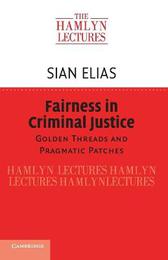
|
Fairness in Criminal Justice: Golden Threads and Pragmatic Patches
Paperback / softback
Main Details
| Title |
Fairness in Criminal Justice: Golden Threads and Pragmatic Patches
|
| Authors and Contributors |
By (author) Sian Elias
|
| Series | The Hamlyn Lectures |
|---|
| Physical Properties |
| Format:Paperback / softback | | Pages:184 | | Dimensions(mm): Height 216,Width 138 |
|
| ISBN/Barcode |
9781108463157
|
| Classifications | Dewey:172.2 |
|---|
| Audience | | Professional & Vocational | |
|---|
| Illustrations |
Worked examples or Exercises
|
|
Publishing Details |
| Publisher |
Cambridge University Press
|
| Imprint |
Cambridge University Press
|
| Publication Date |
23 August 2018 |
| Publication Country |
United Kingdom
|
Description
British criminal justice is a principal legacy of Empire in the common law world. It attempts fairness between prosecutors and accused in an accusatory system for establishing criminal responsibility supervised by a judge who is conspicuously detached from the fray. Fundamental features, today recognised as human rights, include the presumption of innocence and onus of proof, the privilege against self-incrimination, and the right to legal advice and representation. In these lectures, Dame Sian Elias examines modern challenges to this conception of criminal justice prompted by anxiety about crime and the costs and delays in proof of guilt. They include enlarged prosecutorial discretion in charging, incentivisation of early guilty pleas, adoption of reverse onuses of proof, application to criminal proceedings of principles of modern civil case management, and measures to bring the victim into the criminal justice system. The lectures question whether this repositioning risks the integrity of the system.
Author Biography
Sian Elias has been Chief Justice of New Zealand since 1999. Educated in New Zealand and the United States, she has practised law since 1972. She was appointed Queen's Counsel in 1988 and has held the position of Law Commissioner. She was appointed a High Court Judge in 1995 and was awarded the New Zealand Order of Merit in 1999. Dame Sian became a member of the New Zealand Supreme Court on its establishment in 2004.
|